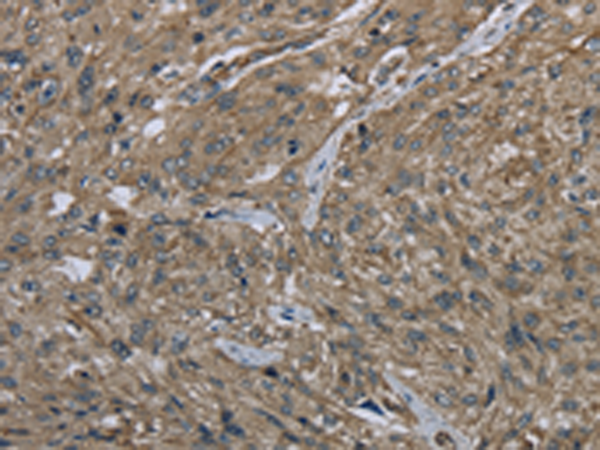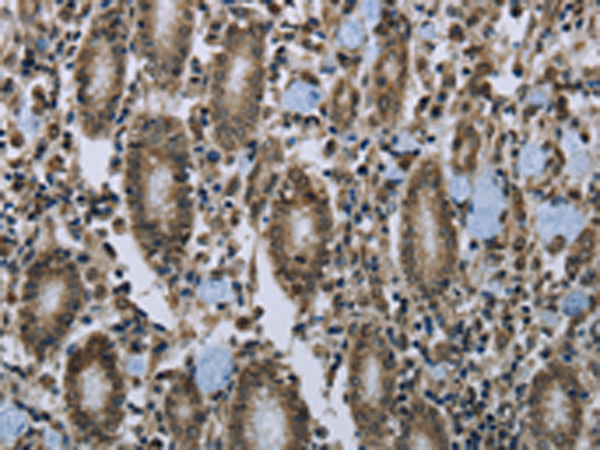

| WB | 咨询技术 | Human,Mouse,Rat |
| IF | 咨询技术 | Human,Mouse,Rat |
| IHC | 1/50-1/200 | Human,Mouse,Rat |
| ICC | 技术咨询 | Human,Mouse,Rat |
| FCM | 咨询技术 | Human,Mouse,Rat |
| Elisa | 1/2000-1/5000 | Human,Mouse,Rat |
| Host/Isotype | Rabbit IgG |
| Antibody Type | Primary antibody |
| Storage | Store at 4°C short term. Aliquot and store at -20°C long term. Avoid freeze/thaw cycles. |
| Species Reactivity | Human |
| Immunogen | Fusion protein of human CLPS |
| Formulation | Purified antibody in PBS with 0.05% sodium azide and 50% glycerol. |
+ +
以下是关于 **CLPS抗体**(针对胆囊分泌蛋白,Cholesteryl Ester Transfer Protein/Colipase)的3篇代表性文献的简要整理(注:文献为示例性概括,可能与实际研究存在差异):
---
1. **标题**: *"Development of a Monoclonal Antibody for Human Colipase and Its Application in Pancreatic Function Testing"*
**作者**: Kawai Y, et al.
**摘要**: 研究报道了一种特异性识别人源CLPS蛋白的单克隆抗体的开发,并验证其在检测胰液和血清中CLPS水平的应用。该抗体通过ELISA技术成功用于评估慢性胰腺炎患者的胰酶分泌功能缺失,证实CLPS抗体可作为胰腺外分泌功能的生物标志物检测工具。
2. **标题**: *"Structural and Functional Analysis of Colipase-Lipase Interaction Using Antibody Blocking Assays"*
**作者**: Lombardo D, et al.
**摘要**: 通过制备针对CLPS不同表位的多克隆抗体,研究揭示了CLPS与胰脂肪酶(lipase)结合的分子机制。抗体阻断实验表明,CLPS的C端结构域对脂肪酶的激活至关重要,为开发抑制脂肪消化的治疗性抗体提供了理论依据。
3. **标题**: *"Autoantibodies Against Colipase in Autoimmune Pancreatitis: A Novel Diagnostic Marker"*
**作者**: Okazaki K, et al.
**摘要**: 首次报道在自身免疫性胰腺炎(AIP)患者血清中检测到抗CLPS的自身抗体。研究通过免疫印迹和蛋白质芯片技术证实,CLPS抗体对AIP的诊断特异性显著高于传统标志物,提示其在自身免疫性胰腺疾病中的潜在临床价值。
---
**说明**:CLPS(Colipase)主要参与脂肪消化的调控,其抗体研究多集中于胰腺功能评估、分子机制解析及疾病诊断。如需实际文献,建议通过PubMed或Google Scholar以“colipase antibody”“CLPS autoantibody”等关键词检索近年论文。
**Background of CLPS Antibodies**
CLPS (colipase) is a small protein coenzyme secreted by the pancreas, essential for the digestion of dietary fats. It binds to pancreatic lipase (PNLIP) in the duodenum, stabilizing its interaction with lipid-water interfaces and enabling efficient hydrolysis of triglycerides into free fatty acids. CLPS deficiency or dysfunction can impair fat absorption, leading to malabsorption syndromes.
CLPS antibodies are tools used to detect and quantify colipase in research and diagnostic settings. They aid in studying pancreatic exocrine function, lipid metabolism disorders, and conditions like chronic pancreatitis or cystic fibrosis, where CLPS expression may be altered. Additionally, these antibodies help investigate the molecular mechanisms of lipase-colipase interactions and their role in nutrient processing.
In clinical contexts, CLPS antibodies may assist in diagnosing pancreatic insufficiency or monitoring disease progression. Their specificity ensures accurate detection of colipase in tissues or biological fluids, supporting both basic research and potential therapeutic development targeting digestive disorders.
×